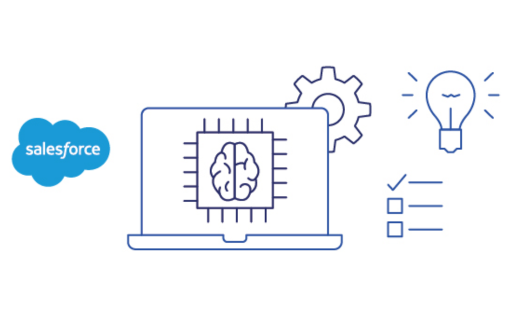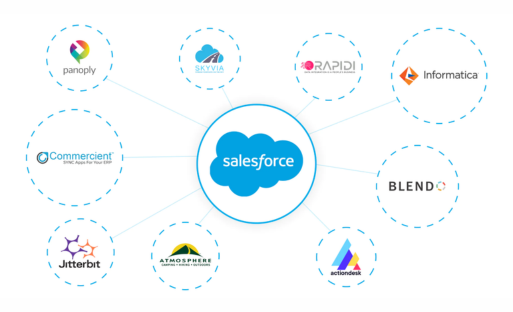Introduction: Salesforce CRM AI and Machine Learning Integration
In the rapidly evolving landscape of customer relationship management (CRM), the infusion of Artificial Intelligence (AI) and machine learning has emerged as a transformative force, propelling businesses towards unprecedented heights of efficiency and customer-centricity. This section delves into the historical roots, current significance, and tangible benefits that AI and machine learning integration bring to Salesforce CRM.
The Evolution of AI in CRM:
As we reflect on the trajectory of CRM, the incorporation of AI represents a pivotal juncture in its evolution. Historically, CRM systems primarily served as repositories for customer data, offering rudimentary functionalities. The emergence of AI marked a paradigm shift by turning CRM into a dynamic, intelligent system capable of sophisticated data analysis and proactive decision-making.
The significance of leveraging AI within Salesforce CRM cannot be overstated. With AI, the system transcends mere data storage, becoming a proactive assistant capable of anticipating user needs, automating mundane tasks, and unlocking insights that were once buried within vast datasets. This evolution aligns seamlessly with the broader trend of leveraging technology not just as a passive tool but as an intelligent collaborator in business operations.
Benefits of AI and Machine Learning Integration:
The integration of AI and machine learning into Salesforce CRM yields a spectrum of benefits that reverberate across various facets of business operations. One of the most pronounced advantages is the enhancement of decision-making through predictive analytics. By analyzing historical data patterns, AI equips decision-makers with predictive insights, enabling them to make informed choices that steer the business towards success.
Customer experiences, the cornerstone of CRM, undergo a transformative upgrade with AI integration. Personalization reaches new heights as AI processes vast datasets to tailor interactions based on individual preferences and behaviors. From suggesting product recommendations to delivering targeted marketing messages, AI ensures that each customer engagement is not just transactional but a personalized journey.
Efficiency gains come to the forefront as routine tasks, previously requiring human intervention, are automated through AI. Mundane processes such as data entry, lead prioritization, and even certain aspects of customer support can be handled autonomously, freeing up valuable human resources for more strategic, high-value tasks.
Real-life Examples of Successful Integrations:
To crystallize the theoretical advantages of AI integration, real-life examples provide tangible evidence of its transformative impact. Case studies abound with instances of businesses achieving remarkable outcomes through the symbiosis of Salesforce CRM and AI.
Consider Company X, a mid-sized e-commerce enterprise that sought to enhance its customer engagement. Through AI-driven analytics in Salesforce CRM, they achieved a substantial increase in conversion rates by strategically targeting customers with personalized offers based on their browsing history and purchase patterns.
In the realm of predictive analytics, Company Y, a B2B service provider, utilized AI to identify potential high-value leads with a high likelihood of conversion. This not only streamlined their sales processes but also significantly increased their revenue generation.
These examples underscore the versatility of AI integration, demonstrating its applicability across diverse industries and business models. The positive impacts on operational efficiency, customer satisfaction, and bottom-line results make a compelling case for businesses contemplating the integration of AI into their CRM systems.
Core Features and Functionality
In the dynamic realm of Salesforce CRM augmented with AI and machine learning, the core features and functionalities pave the way for a paradigm shift in how businesses engage with their customers. This section provides an in-depth exploration of predictive analytics, personalized recommendations, task automation, and the generation of enhanced data-driven insights.
-
Predictive Analytics in Salesforce CRM:
The integration of AI brings the power of predictive analytics to Salesforce CRM, transforming it from a reactive system to a proactive, anticipatory ally. Predictive analytics leverages historical data, customer behaviors, and contextual information to forecast future trends and behaviors. In the context of sales and marketing strategies, this capability becomes a game-changer.
Consider a scenario where Salesforce CRM, equipped with predictive analytics, analyzes past purchase patterns, lead interactions, and market trends. The system can then generate accurate predictions regarding which leads are most likely to convert into customers, enabling sales teams to prioritize their efforts effectively. Marketing strategies, too, can be fine-tuned based on predictions about customer preferences, optimizing the allocation of resources for maximum impact.
-
Personalized Recommendations for Enhanced Customer Experiences:
At the heart of customer-centricity lies the ability to deliver personalized experiences, and AI in Salesforce CRM is the catalyst for achieving this level of customization. Personalized recommendations, driven by machine learning algorithms, take customer engagement to unprecedented levels of relevance.
Imagine a scenario where a customer logs into an e-commerce platform integrated with Salesforce CRM. The system, powered by AI, analyzes the customer’s past purchases, browsing history, and preferences. In real-time, it generates personalized product recommendations, suggesting items that align with the customer’s tastes. This not only enhances the likelihood of a purchase but also elevates the overall customer experience by making interactions more meaningful and tailored.
-
Automation of Routine Tasks:
One of the most tangible benefits of AI integration in Salesforce CRM is the automation of routine, repetitive tasks. The system, infused with machine learning capabilities, can autonomously handle a myriad of operational tasks, liberating human resources for more strategic endeavors.
Consider the automation of lead scoring—a task traditionally requiring manual evaluation. With AI, Salesforce CRM can autonomously assess leads based on predefined criteria, assigning scores that reflect their likelihood to convert. This not only accelerates the lead qualification process but also ensures that sales teams focus their efforts on leads with the highest potential, optimizing overall efficiency.
-
Enhanced Data-Driven Insights:
The marriage of machine learning and Salesforce CRM empowers businesses with enhanced data-driven insights. Beyond conventional analytics, machine learning algorithms delve into data with a depth that goes beyond human capabilities. This section explores how businesses can leverage these insights for strategic decision-making.
Machine learning excels in uncovering patterns, correlations, and outliers within vast datasets. In the context of Salesforce CRM, this translates to a comprehensive understanding of customer behaviors, market trends, and operational efficiencies. By extracting meaningful insights, businesses gain a competitive edge, enabling them to make informed decisions that resonate with the dynamic nuances of their market.
-
Integrating AI and Machine Learning into Workflows:
Beyond standalone features, the true potential of AI in Salesforce CRM is realized when seamlessly integrated into existing workflows. This subtopic delves into how businesses can embed AI and machine learning functionalities into their day-to-day operations.
Consider a scenario where a sales representative, armed with insights from predictive analytics, initiates a targeted email campaign directly within the Salesforce CRM interface. The system, recognizing the optimal timing and content based on historical data, automates the campaign, ensuring personalized messages reach the right audience at the right time. This integration not only saves time but also enhances the precision and impact of marketing efforts.
-
Overcoming Implementation Challenges:
While the benefits of AI integration are vast, businesses often face challenges during the implementation phase. This subtopic addresses common hurdles and provides strategies for overcoming them.
Implementing AI and machine learning in Salesforce CRM requires a strategic approach. Challenges may include data quality issues, resistance to change, or the need for specialized training. The key is to approach implementation with a comprehensive plan, ensuring that all stakeholders are on board and that the technology aligns seamlessly with existing processes.
In conclusion, the core features and functionalities of AI and machine learning integration in Salesforce CRM transcend conventional capabilities. They usher in a new era of predictive insights, personalized experiences, and streamlined operations. As businesses navigate this transformative landscape, the subsequent sections will explore advanced integration strategies and best practices to unlock the full potential of these technologies.
Advanced Integration Strategies
As businesses continue to harness the power of AI in Salesforce CRM, this section delves into advanced integration strategies that propel organizations into the realm of cutting-edge capabilities. From leveraging advanced AI features to tailoring custom workflows and ensuring scalability, these strategies elevate CRM functionality to unprecedented heights.
-
Leveraging Advanced AI Capabilities:
The landscape of AI is continually evolving, and Salesforce CRM stands at the forefront of innovation. This subtopic explores the cutting-edge AI features available, pushing the boundaries of what’s possible within the CRM space.
Exploring Cutting-Edge AI Features:
Salesforce CRM’s commitment to innovation is exemplified by features like image recognition, sentiment analysis, and anomaly detection. Businesses can leverage image recognition to analyze and categorize visual content, sentiment analysis to gauge customer emotions, and anomaly detection to identify irregular patterns in data. Understanding the nuances of these features opens new avenues for customer engagement, marketing strategies, and operational efficiency.
The Role of Deep Learning and Natural Language Processing:
Deep learning and natural language processing (NLP) represent the pinnacle of AI sophistication. Salesforce CRM’s integration with deep learning models allows for more intricate pattern recognition and decision-making. NLP, on the other hand, enables the system to comprehend and respond to natural language queries. Exploring the applications of these advanced capabilities unveils possibilities such as advanced chatbots, dynamic content creation, and nuanced customer interactions.
-
Custom Workflows for Tailored Solutions:
While out-of-the-box functionalities provide a solid foundation, custom workflows take AI integration in Salesforce CRM to the next level. This subtopic emphasizes the design of workflows that align precisely with business needs and can be tailored to accommodate industry-specific requirements.
Designing Workflows Aligned with Business Needs:
Businesses vary widely in their operations, and a one-size-fits-all approach may not suffice. Custom workflows allow organizations to design processes that mirror their unique requirements. This could involve creating personalized lead scoring algorithms, automating industry-specific compliance checks, or tailoring communication workflows to align with the intricacies of the business model.
Ensuring Customization for Industry-Specific Requirements:
Different industries have distinct nuances, regulations, and workflows. The customization of AI in Salesforce CRM enables organizations to tailor solutions that adhere to industry-specific requirements. Whether it’s healthcare, finance, or manufacturing, custom workflows ensure that the CRM aligns seamlessly with the intricacies of the industry, fostering efficiency and compliance.
-
Scalability of AI Integration:
As businesses grow and data volumes increase, ensuring the scalability of AI integration becomes paramount. This subtopic explores strategies for scaling AI integration within Salesforce CRM to accommodate expanding data volumes and evolving business needs.
Strategies for Scaling AI Integration:
Scalability involves preparing the AI integration to handle growing data loads without compromising performance. This might include optimizing algorithms, adopting cloud-based solutions for increased computing power, and ensuring that the infrastructure can seamlessly adapt to larger datasets. Strategies for scaling also involve future-proofing the integration to accommodate technological advancements and evolving business requirements.
Future-Proofing the Integration:
The pace of technological evolution demands a forward-looking approach to AI integration. Future-proofing involves anticipating upcoming trends, staying abreast of Salesforce CRM updates, and ensuring that the integration remains adaptable to emerging technologies. This strategy positions businesses not only to handle current demands but also to readily embrace innovations on the horizon.
In essence, advanced integration strategies in Salesforce CRM transcend the ordinary, unlocking the full potential of AI capabilities. By embracing cutting-edge features, tailoring workflows, and ensuring scalability, businesses position themselves at the vanguard of CRM innovation. The subsequent section will explore best practices and implementation tips to guide organizations in their journey toward seamless AI integration.
Best Practices and Implementation Tips
This section outlines the critical best practices and implementation tips for ensuring the seamless integration of AI into Salesforce CRM. From comprehensive project planning to ongoing user support, these strategies are instrumental in maximizing the benefits of AI while minimizing potential challenges.
A. Comprehensive Project Planning:
- Developing a Detailed Plan for AI Integration Projects:
Successful AI integration requires meticulous planning. This involves creating a comprehensive project plan that outlines the specific goals, tasks, and timelines. The plan should address key components, such as data migration, customization of workflows, and user training. By establishing a roadmap from the outset, organizations can navigate the integration process with clarity and purpose.
- Setting Realistic Timelines and Milestones:
Realistic timelines and achievable milestones are crucial for project success. Overambitious timelines can lead to rushed implementations, compromising data accuracy and user adoption. Setting achievable milestones ensures that each phase of the integration is executed with precision, contributing to a smoother overall process.
B. Maintaining Data Quality:
- Strategies for Ensuring Data Accuracy and Consistency:
Data is the lifeblood of AI integration, making data quality a paramount concern. Implementing strategies to ensure accuracy and consistency is vital. This may involve data cleansing before integration, establishing validation rules, and employing data profiling tools to identify and rectify anomalies. Maintaining a high standard of data quality enhances the effectiveness of AI-driven insights and decision-making.
- Implementing Data Quality Checks Throughout the Integration Process:
Rather than treating data quality as a one-time effort, organizations should incorporate ongoing checks throughout the integration process. Automated checks, validation rules, and regular audits contribute to a proactive approach in maintaining data quality. This iterative process ensures that the CRM’s data remains reliable and up-to-date.
C. User Training for Effective Adoption:
- Designing Training Programs to Familiarize Users with AI Features:
User training plays a pivotal role in the successful adoption of AI features. Designing training programs that specifically target AI functionalities within Salesforce CRM ensures that users are well-versed in leveraging these capabilities. This may include hands-on workshops, online tutorials, and interactive learning sessions.
- The Importance of Ongoing Training to Keep Users Updated:
AI technologies and CRM platforms undergo updates and enhancements regularly. It’s crucial to emphasize ongoing training to keep users abreast of new features and functionalities. Continuous learning ensures that users can maximize the benefits of AI integration, stay efficient, and adapt to evolving business needs.
D. Investing in Ongoing Support:
- Establishing a Support System for Addressing User Queries:
A robust support system is essential for addressing user queries and concerns. Establishing a dedicated support team or helpdesk ensures that users have a reliable resource to turn to when encountering challenges or seeking clarification. Prompt and effective support fosters user confidence and promotes a positive experience.
- Regular System Updates and Maintenance for Optimal Performance:
Regular updates and maintenance are fundamental for the optimal performance of AI-integrated CRM systems. This includes applying software updates, patches, and security enhancements. A well-maintained system not only ensures security but also facilitates the incorporation of the latest features and improvements.
In conclusion, adhering to these best practices and implementation tips forms the cornerstone of a successful AI integration journey in Salesforce CRM. The subsequent section will provide a comprehensive conclusion, summarizing key takeaways and emphasizing the transformative impact of AI on CRM capabilities.
Integration with Salesforce AI Platforms
This section delves into the integration of Salesforce CRM with cutting-edge AI platforms, particularly focusing on Salesforce’s own Einstein Analytics. Exploring the process, collaborative benefits, and real-world success stories, this segment underscores the transformative power of AI integration in enhancing data analysis and decision-making.
A. Introduction to Einstein Analytics:
- Overview of Salesforce’s AI Platform:
Einstein Analytics stands at the forefront of Salesforce’s AI capabilities. This subsection provides an overview of this advanced platform, emphasizing its role in transforming raw data into actionable insights. Readers will gain insights into how Einstein Analytics brings a new dimension to CRM by enabling predictive analytics and intelligent data processing.
- Key Features and Capabilities of Einstein Analytics:
Delving into the specifics, this part explores the key features and capabilities that set Einstein Analytics apart. From machine learning algorithms to data visualization tools, understanding these functionalities lays the groundwork for comprehending the subsequent integration process.
B. Integration Process with Salesforce AI:
- Step-by-Step Guide on Integrating Salesforce CRM with Einstein Analytics:
Offering a step-by-step guide, this subsection navigates users through the integration process. From initial setup to ensuring a seamless flow of data between Salesforce CRM and Einstein Analytics, readers will gain practical insights into making this integration a reality within their business environment.
- Ensuring a Seamless Flow of Data Between the Two Platforms:
Emphasizing the importance of a smooth data flow, this part highlights considerations for ensuring a seamless integration experience. Addressing potential challenges and providing solutions, users will be equipped to optimize data exchange between the CRM and AI platforms.
C. Collaborative Insights with AI Integration:
- Enhancing Collaboration and Communication Through Integrated AI Insights:
The collaborative benefits of AI integration extend beyond data analysis. This subsection explores how the integration fosters collaboration among teams by providing unified insights. From marketing to sales and customer service, the collaborative potential of AI-driven data analysis is elucidated.
- Demonstrating the Collaborative Benefits of AI-Driven Data Analysis:
Providing practical examples, this part illustrates scenarios where AI-driven data analysis contributes to improved collaboration. Whether it’s identifying market trends or streamlining customer interactions, readers will understand how integrated AI insights positively impact various facets of business operations.
D. Success Stories of Salesforce AI Integration:
- Showcasing Businesses That Have Successfully Integrated Salesforce CRM with AI Platforms:
Real-world success stories bring the theoretical aspects of AI integration to life. This subsection showcases businesses that have successfully implemented Salesforce CRM integration with AI platforms, highlighting the tangible benefits experienced in terms of data analysis, decision-making, and overall business success.
- Highlighting the Positive Impact on Data Analysis, Decision-Making, and Overall Business Success:
Summarizing these success stories, this part emphasizes the positive impact of AI integration on critical business aspects. From more informed decision-making to streamlined operations, readers will grasp the transformative effects that AI can have on the overall success of a business.
This exploration into Salesforce AI integration sets the stage for the conclusion, where key takeaways will be consolidated, and the profound impact of incorporating AI into CRM systems will be underscored.
Future Trends in AI and CRM Integration
This section casts a visionary gaze into the future, examining the technological advancements in AI and their potential impact on the evolving landscape of CRM integration. By exploring emerging trends and anticipating the evolution of CRM platforms, readers gain valuable insights into what the future holds for AI integration.
A. Technological Advancements in AI:
- Exploring the Latest Developments in AI Technology:
Delving into the rapidly evolving realm of AI, this subsection surveys the latest technological advancements. From breakthroughs in machine learning algorithms to innovations in natural language processing, readers gain a comprehensive understanding of the cutting-edge developments shaping the AI landscape.
- How These Advancements May Shape the Future of CRM Integration:
Building on the exploration of AI advancements, this part draws connections to their potential impact on CRM integration. By examining how these technological strides may be harnessed within CRM systems, readers are presented with a forward-looking perspective on the synergies between AI and CRM in the years to come.
B. The Evolving Landscape of CRM:
- Predictions for How CRM Platforms Will Continue to Integrate AI Capabilities:
Anticipating the trajectory of CRM platforms, this subsection offers predictions on how these systems will further integrate AI capabilities. Whether it’s enhanced automation, more sophisticated analytics, or deeper personalization, readers gain insights into the evolution of CRM functionalities.
- Anticipated Benefits for Businesses Adopting the Latest AI Trends in CRM:
Concluding the exploration of future trends, this part highlights the potential benefits for businesses embracing the latest AI trends in CRM. From improved operational efficiency to a deeper understanding of customer behaviors, readers gain a glimpse into the advantages awaiting those who stay at the forefront of AI and CRM integration.
This forward-looking exploration sets the stage for the conclusion, where the collective insights into AI integration trends will be synthesized, underlining the importance of staying abreast of technological advancements for continued business success.
Conclusion
In conclusion, the integration of Artificial Intelligence (AI) with Customer Relationship Management (CRM) in Salesforce marks a transformative journey toward enhanced business intelligence and customer engagement. As we navigate the current landscape of AI and CRM integration, it becomes evident that businesses leveraging these technologies are poised for sustained success.
The synergies between AI and CRM, explored throughout this comprehensive guide, underscore the profound benefits of predictive analytics, personalized recommendations, and streamlined automation. From the evolution of AI in CRM to real-life success stories, businesses have a roadmap to navigate this dynamic terrain successfully.
Looking ahead, the future trends in AI and CRM integration promise even more exciting possibilities. As technological advancements continue to unfold, businesses can anticipate enhanced CRM functionalities, improved automation, and deeper insights, empowering them to stay ahead in the competitive landscape.
In adopting these future trends, businesses position themselves to reap the rewards of a seamlessly integrated AI-CRM ecosystem. From improved decision-making to unparalleled customer experiences, the outlook is promising for those embracing the cutting edge of technology.
In essence, this guide serves as a beacon for businesses seeking not only to understand the current landscape but also to prepare for the unfolding future of AI and CRM integration, where innovation and strategic foresight lead to sustained success.









